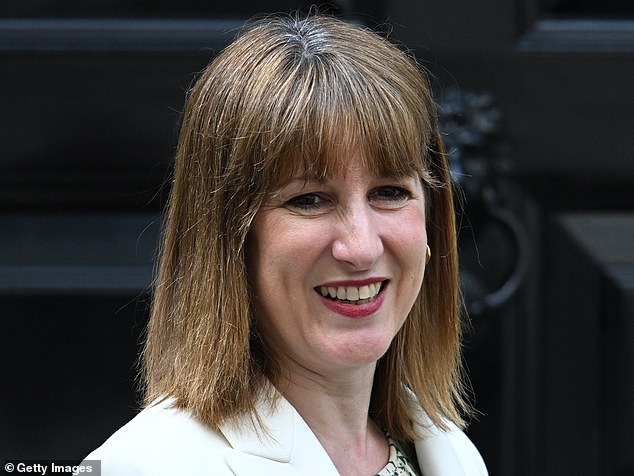[ad_1]
Let’s be honest. We’re going to get a lot more inflation. Why? Two reasons. First, Rachel Reeves and the rest of this Government secretly quite welcome it.
Second, the Bank of England isn’t strong enough to tackle the scourge, even though that is its most important job.
If you think that is too cynical, look at the evidence of the past few days. We had inflation figures showing that the Consumer Price Index, the CPI, was running at 3.4 per cent.
It’s bad enough that this is way above the Bank’s 2 per cent target, but dig deeper and the numbers get worse.
Allow for owner-occupied housing costs, the so-called CPIH, and the figure is 4 per cent. This is a more accurate tally for most of us since 64 per cent of our homes are owner-occupied. It gets worse.
The RPI, the Retail Prices Index, which sets the costs of many business contracts and the charges on the index-linked portion of our national debt, rose 4.3 per cent.

Plenty to smile about?: Rachel Reeves and the rest of this Government secretly quite welcome inflation
On any rational assessment, inflation is running at double the target rate. You would imagine there would be some debate at the Bank about increasing interest rates, particularly since it expects inflation to continue around this level, maybe higher, through the autumn.
But no, three of the Monetary Policy Committee voted for a cut, the rest voted to keep rates where they are.
This says that they are more worried about a soft economy, and in particular the job losses, that are feeding through as a result of the increase in employers’ National Insurance, than they are about inflation.
Of course, they are right to be concerned about the economy. We all are. But in effect, they are having to compensate for what most economists would agree was a mistake by Rachel Reeves: clobbering businesses in her Budget last year.
Now look at all this from the Chancellor’s perspective. She is in a jam. Revenues are weaker than she and the Office for Budget Responsibility expected, and it looks like there will have to be tax increases in the Autumn Budget.
That is before all the extra money needed for defence and all the other pressures on spending pile in. There is, however, one thing that is helping: fiscal drag.
Higher inflation boosts revenues as rising wages push people into higher tax brackets – even if in real terms their pay does not rise at all.
Think back to Reeves’ statement on public spending ten days ago. All that stuff about millions more for a list of projects, and a reference to lower interest rates, but barely a squeak about inflation.
For what it’s worth, the CPI in June last year – the month before Labour won the General Election – was exactly on target: 2 per cent. It’s called the money illusion. The Government can say it is spending more money, but in real terms, it may end up spending less.
In defence of our government, we are not alone. In the US, Donald Trump’s tariffs will inevitably increase prices. In Europe, rearmament will be financed by more borrowing, which will pile pressure on prices there.
But the fact is, our inflation figure of 3.4 per cent compares with 2.4 per cent in the US and 1.9 per cent in the eurozone. No wonder our government has to pay more to finance its national debt than any other G7 nation.
The harsh judgment on the Bank of England is that it has been less effective in carrying out its prime duty than the US Federal Reserve or the European Central Bank.
The thing that worries me most about inflation, even more than the economic costs, is the social damage it causes. Those with strong bargaining power, like heavily unionised train drivers, can negotiate above-inflation pay rises. But those in weaker positions cannot, and right now risk losing their jobs.
If asset prices soar – and despite global mayhem, shares are close to all-time highs – those with the greatest wealth gain the most. The most sophisticated investors benefit. But those unable to pay for the best advice see the value of their savings whittled away. It is the fault of our government and our central bank.
We deserve better.
DIY INVESTING PLATFORMS

AJ Bell

AJ Bell
Easy investing and ready-made portfolios

Hargreaves Lansdown

Hargreaves Lansdown
Free fund dealing and investment ideas

interactive investor

interactive investor
Flat-fee investing from £4.99 per month

InvestEngine

InvestEngine
Account and trading fee-free ETF investing
Trading 212
Trading 212
Free share dealing and no account fee
Affiliate links: If you take out a product This is Money may earn a commission. These deals are chosen by our editorial team, as we think they are worth highlighting. This does not affect our editorial independence.
[ad_2]
This article was originally published by a www.dailymail.co.uk . Read the Original article here. .

